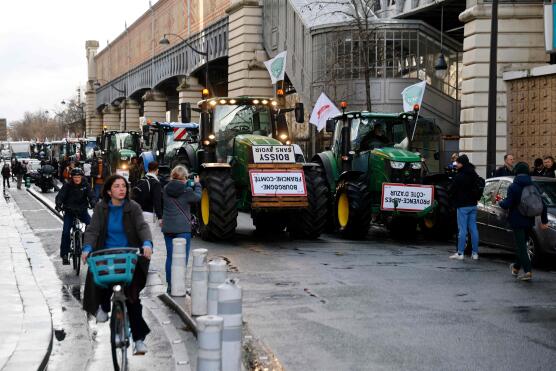
Paris, France: February 23, 2024: Farmers from across France converged on the streets of central Paris today, driving their tractors into the heart of the city to voice their grievances against President Emmanuel Macron’s agricultural policies.
The demonstration comes on the eve of the Salon de l’Agriculture, a significant annual event that serves as a platform for farmers to engage with the public and policymakers.
The farmers’ convoy, comprising approximately 30 tractors, made its way towards Les Invalides, a symbolic location near the Assemblée Nationale and the Elysée presidential palace.
A second convoy is anticipated to join the protest later in the day, underscoring the intensity of their dissatisfaction.
At the core of the farmers’ discontent are what they perceive as onerous environmental regulations and the looming threat posed by cheap imports from non-European Union countries.
Additionally, many farmers continue to struggle with insufficient income, prompting calls for concrete measures to address their financial challenges.
Prime Minister Gabriel Attal’s recent announcement of measures aimed at bolstering the agricultural sector failed to assuage the farmers’ concerns.
Despite promises to prioritize agriculture as a national interest and the unveiling of an agriculture bill intended to tackle farmers’ grievances, the demonstrations have persisted, with farmers resorting to blockades of motorways, roundabouts, and supermarkets.
President Macron’s attempt to initiate a dialogue by convening a debate involving various stakeholders in the agriculture sector encountered immediate obstacles.
The inclusion of the radical ecology group “Soulèvements de la Terre” sparked outrage among farming unions, opposition figures, and even members of Macron’s own government.
The group, previously labeled as “eco-terrorists” by Macron’s interior minister, was swiftly disinvited, but the damage had been done.
Arnaud Rousseau, the head of FNSEA, characterized Macron’s initiative as “cynical” and expressed reluctance to participate in a process that lacked conducive conditions for dialogue.
Faced with mounting pressure and a boycott threat from farming unions, Macron ultimately opted to cancel the event altogether, opting instead to meet with representatives of the farmers’ unions prior to the opening of the agricultural fair.
The cancellation of the debate underscores the deepening rift between the government and France’s agricultural community.
With tensions running high and farmers determined to make their voices heard, the upcoming Salon de l’Agriculture is poised to be a highly charged and politically charged event.
As the nation grapples with the complexities of agricultural policy and the challenges facing rural communities, Macron faces a formidable task in reconciling divergent interests and restoring trust with France’s farming population.
The outcome of these deliberations will not only shape the future of the agricultural sector but also have broader implications for the country’s socio-economic landscape.
In the midst of escalating tensions and uncertainty, one thing remains clear: the plight of France’s farmers demands urgent attention and concerted efforts to address their concerns in a meaningful and constructive manner.
This article was created using automation technology and was thoroughly edited and fact-checked by one of our editorial staff members